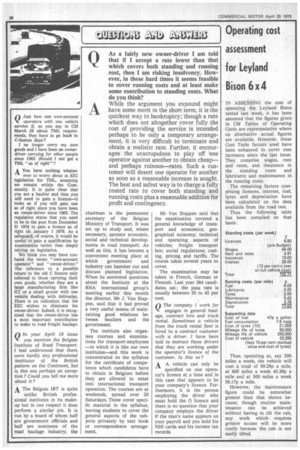Q In your April 18 issue you mention the Belgian Institute
Page 38

If you've noticed an error in this article please click here to report it so we can fix it.
of Road Transport. I had understood that there were hardly any professional institutes of the British pattern on the Continent, but is this one perhaps an exception? Could you tell me more about it ?
A The Belgian IRT is quite unlike British professional institutes in its makeup but in one respect it does perform a similar job. It is run by a board of whom half are government officials and half are nominees of the road haulage industry; •the chairman is the permanent secretary of the Belgian Ministry of Transport. It was set up to study and, where necessary, sponsor economic, social and technical developments in road transport. As well as this, it has become a convenient meeting place at which government and industry can hammer out and discuss planned legislation. When he answered questions about the Institute at the RHA' international group's meeting earlier this month the director, Mr J. Van Stappen, said that it had proved a very useful means of maintaining good relations between hauliers and the government.
The institute also organises courses and examinations for transport employees —in which it is like our own institutes—and this work is concentrated on the syllabus for the certificate of competence which candidates have to obtain in Belgium before they are allowed to enter into international transport operation. The courses are at weekends, spread over 20 Saturdays. These cover specific material in the syllabus, leaving students to cover the general aspects of the subjects privately by text book or correspondence arrangement. Mr Van Stappen said that the examination covered a general knowledge of transport and economics; geographical economy; technical and operating aspects of vehicles; freight transport law; social regulations; costing, pricing and tariffs. The course takes several years to cover.
The examination may be taken in French, German or Flemish. Last year 384 candidates sat ; the pass rate is usually between 35 to 45 per cent.




















































































